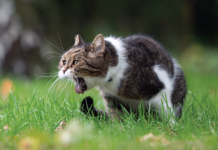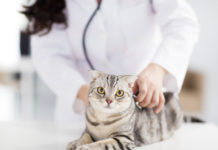Q. Why does my cat have such bad breath? The vet anesthetized her for a dental cleaning and found that her teeth really didn’t need it. (She didn’t let the vet look in her mouth at her checkup.) She has had two teeth removed, but apparently the remaining teeth are in great shape, so what else might be causing the foul breath?
A. Thank you for contacting me about this common problem. Generally speaking, a cat’s breath should not be offensive. We are not offensive creatures, so this makes perfect sense! While bad breath (halitosis) usually results from a relatively benign and manageable process, it can indicate a more serious situation.
The most common cause is a buildup of odor-producing bacteria in the oral cavity. In a manner similar to that seen in people, this buildup is often associated with dental or gingival disease. (The gingiva is a fancy word for the gums.) Plaque, a relatively soft and easily removed material, occurs when bacteria sticks to the teeth. It can accumulate if not removed and ultimately form tartar. Tartar is a much harder material and more difficult to remove. Plaque and tartar buildup can result in halitosis if not addressed in a timely fashion.
Diet can contribute to the development of plaque and tartar by having food particles become lodged between teeth and gums, thereby providing a substrate for bacterial growth.
If unmanaged, these processes may affect the gingiva’s health. Some cats are prone to inflammation and/or infection of the gums that may also be colonized by bacteria (gingivitis). Gingivitis, sometimes called periodontal disease, may contribute to halitosis, and may also cause affected cats to lose their appetites, drool and paw at their mouths.
In some cases, halitosis may not be due to a buildup of bacteria in the mouth but to a more serious medical problem. Cats with kidney disease, for example, may develop foul breath comparable to the odor of urine. It results from the buildup of toxic waste products in the bloodstream. These cats may also suffer from ulcers of the oral cavity as the severity of the problem advances. Diabetic cats may develop a sweet-smelling fruity breath, and those with certain types of liver abnormalities can develop bad breath if not diagnosed and treated properly.
Infections and other problems in the lungs and/or airways may cause a cat’s breath to become unpleasant, as can some gastrointestinal problems. So you see that while halitosis is usually an indicator of dental and/or gingival disease, it is important to keep the possibility of a more significant health problem in mind.
Although it was determined to be unnecessary in your cat’s case, a dental cleaning may be in order when dental and/or gingival disease is the issue. If tartar formation and/or gingivitis are not addressed early on, tooth loss may result. Regular tooth brushing and monitoring can minimize these problems. Several toothpastes on the market are designed especially for cats. It is important not to use toothpaste for people because it can cause stomach upset in cats.
You may wish to discuss routine dental care with your cat’s veterinarian. You can also learn more — and see a video on toothbrushing — at the Cornell Feline Health Center’s website at: http://partnersah.vet.cornell.edu/pet-owners/cat-teeth.
In any event, please discuss your cat’s persistent halitosis with the veterinarian. If it not due to periodontal disease but another medical problem, he or she may perform diagnostics to rule out other causes and create a treatment plan.
It sounds like you are doing a good job monitoring your kitty’s health and that you are being proactive about her care. Perhaps regular toothbrushing may help, but if not, with veterinary care, you will be well on your way
to helping your girl stay happy and healthy.
I hope this information is helpful, and that before long your kitty’s breath is a thing of beauty … or at least not offensive any more! Please keep in touch. —Best regards, Elizabeth ❖



